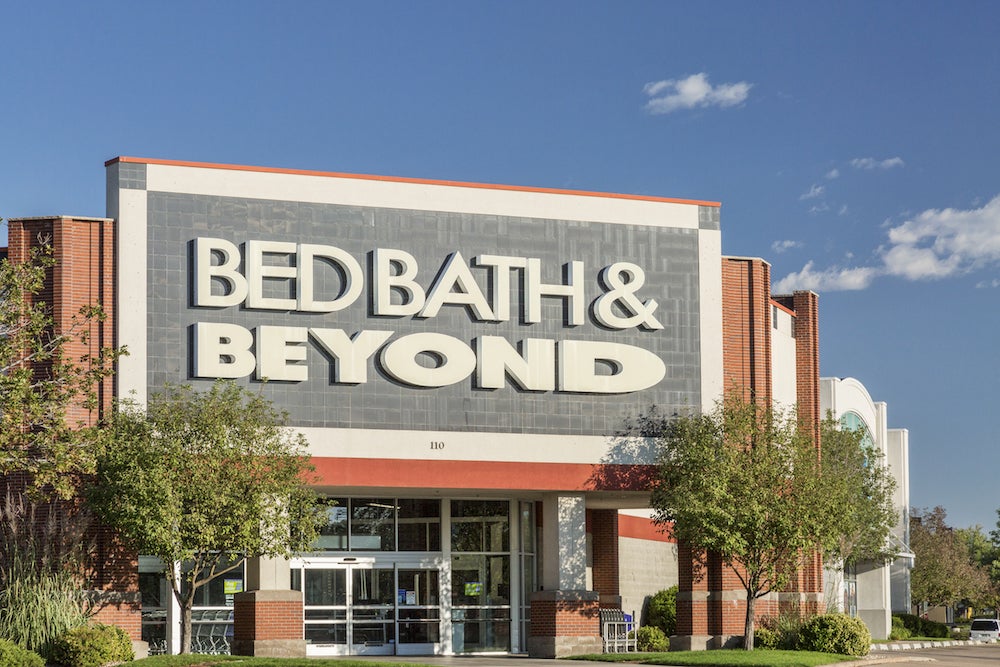Market Watch columnist Dennis Scully analyzes the ups—and mostly downs—at retailers Bed Bath & Beyond, RH and Wayfair. From new leadership to a major settlement with an investor group, here’s everything you need to know about these publicly traded brands.
CHANGE AT THE TOP FOR BED BATH & BEYOND
The group of activist investors working to transform the management team at Bed Bath & Beyond has forced the resignation of longtime CEO Steven Temares. Mary Winston, who was only recently appointed to the board, and was formerly the CFO of the Family Dollar stores, will serve as interim CEO while the company begins the search for a new leader. Temares, who had served as CEO since 2003, was seen by many as the primary obstacle to meaningful and positive change at the company. Under his leadership, shares of Bed Bath & Beyond lost nearly 60 percent of their value, and this year the company reported its first ever annual loss. Massive challenges await anyone who steps into this role: Difficult decisions remain about what stores to close and which acquisitions to jettison. But this is a major step forward for the troubled company—the first real sign of hope for the organization in years.
RH PAYS OUT
According to documents filed in federal court in California, RH has tentatively agreed to a $50 million settlement in a 2016 class action lawsuit brought by a group of investors who claim they were misled by leadership about the launch of RH Modern. During that tumultuous period, the company lost $3 billion of its market capitalization as it struggled to fulfill orders. The suit sought to hold chairman and CEO Gary Friedman, as well as former CFO Karen Boone, largely responsible for the misinformation provided during that time regarding inventory levels and the company’s ability to manufacture this new product offering.
The settlement offer will now come before the Honorable Yvonne Gonzalez Rogers of the U.S. District Court for the Northern District of California on June 18.
Meanwhile, RH has been busy borrowing money since its last disappointing earnings release at the end of March. After acknowledging in December 2018 that market conditions were not conducive to raising money through convertible securities (short-term loans that offer the lender a chance to convert their note into equity), RH was forced to take on two sizable loans in April, one for $120 million, then another for $200 million. The latter comes with a surprisingly high interest rate (roughly 9 percent), suggesting that lenders might be growing a little wary of RH’s financial condition.
Though the debt will burden RH’s balance sheet (at least $18 million per year will be needed simply to cover interest), the infusion of cash comes at a much-needed time. RH’s balance sheet at the end of last quarter showed that it had less than $6 million on hand. In addition to the money it may now need to settle its legal issues, the company has a convertible note of $350 million that will mature in June. Its shares have fallen nearly 40 percent since March; RH’s lenders aren’t the only ones growing nervous about the company’s future.
WAYFAIR STUMBLES
Wayfair shares fell sharply last week as the direct-to-consumer furniture company reported yet another quarter of losses. Despite revenues increasing by nearly 40 percent in the three-month period, losses nearly doubled from year-ago levels. All told, Wayfair lost $200 million in the last quarter, much of it driven by a dramatic increase in customer acquisition costs. The company reported spending $244 million on advertising last quarter—almost 13 percent of its revenue.
The consensus is growing that between its massive investment in logistics and the money it must spend to capture and retain customers, Wayfair may never achieve profitability. The 429-year-old investment bank Berenberg reached the same conclusion as it initiated its coverage of Wayfair last week with a sell recommendation, writing: “We do not see a sustainable path to profitability for Wayfair and believe these risks are not fully priced in.” Berenberg suggested share prices could fall at least another 20 points from current levels.
____________
 Dennis Scully is the host of the weekly BOH podcast, where he explores the changes and challenges facing the interior design community through interviews with industry thought leaders, entrepreneurs and creatives. He is also the vice president of sales and marketing at luxury textiles company Castel. Scully was previously a business development consultant for major trade brands, and has held sales and marketing roles at Domino, Waterworks and Twill Textiles. In his Market Watch columns, Scully calls upon his background as an analyst and long-time securities trader as he explores the ins and outs of the home industry’s publicly traded businesses.
Dennis Scully is the host of the weekly BOH podcast, where he explores the changes and challenges facing the interior design community through interviews with industry thought leaders, entrepreneurs and creatives. He is also the vice president of sales and marketing at luxury textiles company Castel. Scully was previously a business development consultant for major trade brands, and has held sales and marketing roles at Domino, Waterworks and Twill Textiles. In his Market Watch columns, Scully calls upon his background as an analyst and long-time securities trader as he explores the ins and outs of the home industry’s publicly traded businesses.
Disclaimer: The author does not hold shares of the companies featured in this column at the time of the story’s publication. The views, thoughts and opinions expressed here belong solely to the author, and do not necessarily reflect those of BOH. The material is for informational purposes only, and does not constitute any form of financial advice.





























